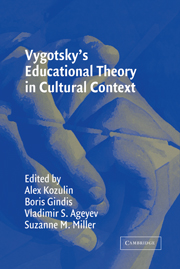Book contents
- Frontmatter
- Contents
- List of Contributors
- Series Foreword
- Introduction: Sociocultural Theory and Education: Students, Teachers, and Knowledge
- PART I CONCEPTS AND PARADIGMS
- PART II DEVELOPMENT AND LEARNING
- PART III SOCIOCULTURAL THEORY APPLICATION IN THE CLASSROOM
- 11 Cultural–Historical Theory and Mathematics Education
- 12 Sociocultural Theory and the Practice of Teaching Historical Concepts
- 13 Formation of Learning Activity and Theoretical Thinking in Science Teaching
- 14 How Literature Discussion Shapes Thinking
- 15 Beyond Cognition
- PART IV DIVERSE LEARNERS AND CONTEXTS OF EDUCATION
- Author Index
- Subject Index
- Titles in the series
- References
15 - Beyond Cognition
A Vygotskian Perspective on Emotionality and Teachers' Professional Lives
Published online by Cambridge University Press: 05 June 2012
- Frontmatter
- Contents
- List of Contributors
- Series Foreword
- Introduction: Sociocultural Theory and Education: Students, Teachers, and Knowledge
- PART I CONCEPTS AND PARADIGMS
- PART II DEVELOPMENT AND LEARNING
- PART III SOCIOCULTURAL THEORY APPLICATION IN THE CLASSROOM
- 11 Cultural–Historical Theory and Mathematics Education
- 12 Sociocultural Theory and the Practice of Teaching Historical Concepts
- 13 Formation of Learning Activity and Theoretical Thinking in Science Teaching
- 14 How Literature Discussion Shapes Thinking
- 15 Beyond Cognition
- PART IV DIVERSE LEARNERS AND CONTEXTS OF EDUCATION
- Author Index
- Subject Index
- Titles in the series
- References
Summary
The emotions are not “a state within a state.” They cannot be understood outside the dynamic of human life. It is within this context that the emotional processes acquire their meaning and sense.
(Vygotsky, 1987, p. 333)That teaching is emotionally charged work is hardly news to those who face its rigors and rewards on a daily basis. At its best, teaching offers exhilaration – the high of watching a class come alive, a reluctant student suddenly motivated, of generating fresh strategies with a group of trusted colleagues. But frustration and sorrow can be constant companions as well – the stress of too much work, too little relational and material support, students who present ever-larger challenges. These more negative emotions have tended to become increasingly prevalent of late, as a wave of top-down school reform has carried the dispiriting implication that something is wrong with teachers' efforts that calls for external fixes and vigilant monitoring (Hargreaves, 1998, 2000). Now more than ever, recruiting and retaining sufficient numbers of able teachers demand attention to the affective aspects of their jobs. Borrowing from the language of best-selling books, we might say that educators must continually find the passion, energy, and courage to sustain their work (Fried, 1995; Graves, 2001; Palmer, 1998).
- Type
- Chapter
- Information
- Vygotsky's Educational Theory in Cultural Context , pp. 317 - 346Publisher: Cambridge University PressPrint publication year: 2003
References
- 28
- Cited by

